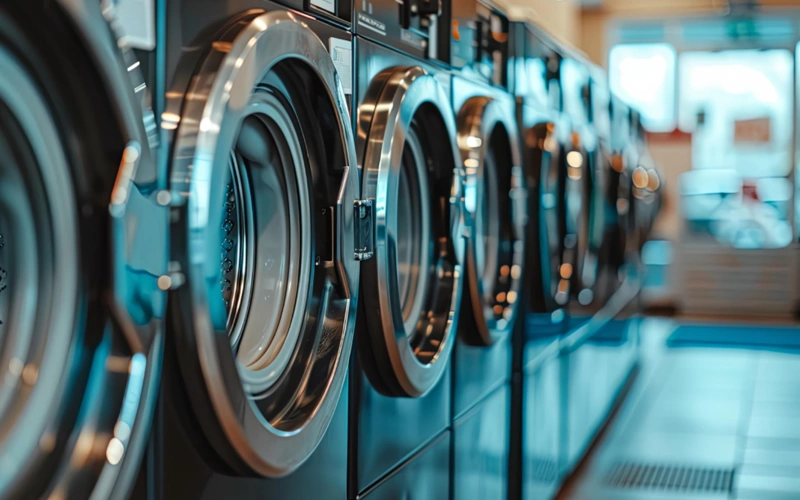As a new entrepreneur, you must make a decision between two different routes-how to set up a business on your own and buy a franchise.
Both are profitable avenues; however, the choice is of several critical factors, including further cost to open a laundromat, franchise fees, operational requirements, and long-term revenues.
Understanding the Cost to Open a Laundromat Independently
The cost to open a laundromat unaided can vary enormously depending on location, construction site size, equipment, and other finish-out variables. On the average, this may go anywhere from $200,000 to over $500,000. Included in such expenditures are:
- Lease or purchase of real estate
- Renovations and plumbing infrastructure
- Purchase of commercial washers and dryers
- Utility hookups
- Licenses, permits, and insurance
- Marketing and beginning utilization of staffing, if needed
A Franchise Laundromat Opportunity and Its Cost To Open a Laundromat
The franchisee usually has to pay a franchise fee between $30,000 and $75,000, in addition to costs for the location. With equipment, leasehold improvements, and working capital included, the total investment cost might get as far as $300,000 to $500,000. Depending on the brand, this might get even higher!
Startup Cost Comparisons
The idea of the cost to open a laundromat independently may strike as being cheap as there is no requirement to pay franchise fees or royalties. However, hidden costs can come into the picture in the form of money or time in creating the brand image, building operational systems, and researching marketing strategies.
In contrast, a franchise would provide most of the hard work into a system prepared for use.
Support Operations and Brand Recognition
Operating a laundromat independently requires control over any aspect of the operation, including negotiation with suppliers, training staff, providing service, and acquiring customers. This freedom can be liberating but also taxing!
A franchise business operates by a well-structured framework. Most laundromat franchisors offer extensive training, assistance with site selection, marketing support, and software tools for customer management and reporting. This would considerably reduce the learning curve and perhaps help the entrepreneur avoid common pitfalls in running a laundry business.
Flexibility and Creative Control
The barriers to staying independent can be flexibility. It is your choice for branding, layout, your pricing model, and your service offerings. You can add pickup and delivery, and you can opt for environmentally friendly detergents or set up a nice little coffee corner. They are well within your rights to go all the way if you want to.
A franchise has fairly rigid brand guidelines. From signage all the way down to store layout and even down to the uniforms, many aspects are standardized. This can be a huge constraint for an entrepreneur trying to bring some innovations into the mix or services geared to the local area.
Profit Margin and Long-Term ROI
In terms of proper analysis measures for profit potential, one cannot say that either of the business models lacks profitability. Depending upon its exact location and the degree of operational efficiency, any average laundromat generates a profit margin of anywhere from 20% to 35%.
Independent laundromats, in theory, if run well, allow the owner to take home 100% of the profits, with the possible downside being that it may take longer to get profitable due to the time it will take to establish the business and brand; that is there are no royalty payments or franchise restrictions to cut directly into the margin.
Franchise, on the other hand, could be more apt to catapult an operation quicker into profitability simply because of brand trust, optimized systems, and pre-built customer bases; royalty fees, however, could carve away a little bit of your bottom-line profit margin through time.
Risk versus Responsibility
Higher is the cost to open a laundromat on your own, along with the risk. It is all on you if you make a mistake in choosing a location, if an equipment malfunctions, or if marketing is wrongly executed.
Franchising takes a bit of that risk off of you. The franchisor has proven the model; it has fine-tuned processes and has weathered economic recessions.
Which Is Better?
There is no cut-and-dried answer to this. Having some business experience along with getting business loans and an existing market approach at the local level, plus wanting to build from the ground up his own brand, may find more control and unlimited possibilities of return through the independent way. This way might even theoretically be cheaper to open initially, but with no royalties.
On the other hand, if you want a path that is more structured with support built in, fast market entry, and lower risk, then the laundromat franchise would be the smarter move for you.
This article on Forbes might give you insights on the cost to open a laundromat! Business Loan Calculator: Estimate Your Payments
Conclusion
Choosing to set up a laundromat on your own versus buying into a laundromat franchise essentially depends on your budget, experience, and long-term plans. Ask yourself, how much support do I need? How much risk am I willing to undertake? How soon do I want to begin seeing returns?
Whether you choose this or that way, if you want to engage in a wise investment for the laundry business, you first ought to gain an understanding of laundromat opening costs that include hidden fees, the duration of the concept, and customer return.
